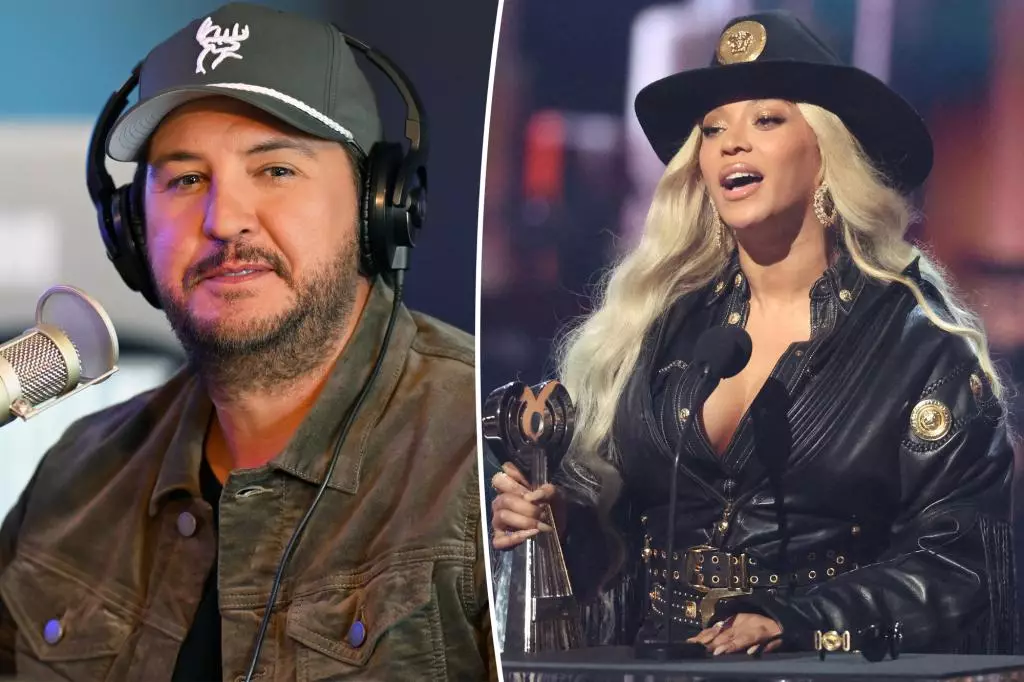The Country Music Association (CMA) Awards are among the most prestigious accolades in the country music genre, celebrating the talents and contributions of artists who have dedicated their careers to the craft. Recently, the absence of Beyoncé from the CMA nominations has sparked heated discussions within the music community. Despite the chart-topping success of her debut country album, “Cowboy Carter,” many country artists and critics are questioning the criteria behind the nominations. Luke Bryan, a prominent figure in the country music scene, has publicly shared his mixed feelings about Beyoncé’s snub, emphasizing that while the genre is open to all, a deeper engagement with country traditions is pivotal for recognition.
Luke Bryan’s Perspective: A Call for Family in Country Music
Bryan articulated his thoughts during a candid discussion on SiriusXM’s “Andy Cohen Live.” He praised Beyoncé for her venture into country music but argued that to truly connect with the country music community, artists should immerse themselves in its culture. Bryan noted, “Come to an award show and high-five us, and have fun and get in the family, too.” This statement underscores a prevalent sentiment among traditionalists in country music who believe that genuine participation and camaraderie are essential to the genre’s identity. Bryan isn’t dismissing Beyoncé’s accomplishment; rather, he is advocating for a sense of belonging that, in his eyes, is necessary for full acceptance.
This perspective raises questions about the exclusivity of genres and the criteria for entering them. It also hints at a deeper narrative about the interconnectedness of various music cultures and the expectations that come with them.
The discourse surrounding Beyoncé’s CMA nominations was not limited to Bryan’s views. Dolly Parton, an iconic figure in country music and a collaborator on “Cowboy Carter,” defended the CMA’s voting committee. Parton acknowledged the richness of Beyoncé’s album but noted the competitive landscape that artists face. “There’s so many wonderful country artists… they probably thought, well, we can’t really leave out some of the ones that spend their whole life doing that,” she explained. Her remarks highlight a potential bias that favors long-established country artists over newcomers, regardless of their talent or influence.
This sentiment resonates with Kelly Clarkson, who has openly shared her struggles to gain acceptance in the country genre. Clarkson recounted instances where she was pressured to abandon pop music entirely to find success in country. Her experiences illustrate the challenges artists face when navigating the complicated boundaries between musical styles and fan expectations.
Beyoncé herself has faced criticism and skepticism as she ventured into country music. She reflected on these challenges when discussing her motivations for creating “Cowboy Carter.” Her remarks reveal how feelings of exclusion inspired her to educate herself about country music’s heritage. Beyoncé stated, “the criticisms I faced when I first entered this genre forced me to propel past the limitations that were put on me.” This determination to challenge existing notions of genre boundaries marks Beyoncé’s artistic evolution and her commitment to creating a multifaceted musical identity.
Moreover, her acknowledgment of the complexities involved in merging different musical influences underscores the necessity for open-mindedness in the industry. As genres continue to blend and evolve, the resistance many artists face serves as a reminder of the ongoing dialogues about authenticity and acceptance in music.
The Broader Implications for Genre and Inclusivity
The discourse surrounding Beyoncé’s CMA snub goes beyond individual recognition; it speaks to broader issues of inclusivity, genre boundaries, and the evolving landscape of the music industry. As new artists from various backgrounds seek to explore and contribute to country music, the genre’s traditional gatekeepers are faced with the challenge of adapting to these changes.
The diversity of voices and experiences can enrich the genre, fostering innovation while staying true to its roots. The ongoing discussions brought about by Beyoncé’s album and CMA nominations reflect an industry in flux, where the integration of various musical styles is both a challenge and an opportunity.
As the country music scene continues to grapple with questions of identity, recognition, and inclusivity, it is vital for artists and fans alike to engage in meaningful conversations that embrace diversity. The path forward may require redefining what it means to be a part of the country music family, creating space for all voices to be heard and celebrated.

